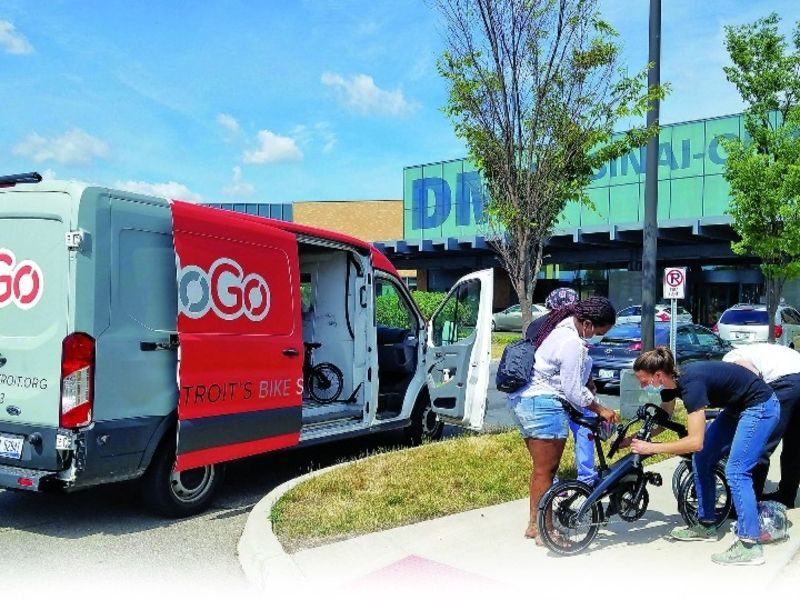
Last fall, city officials in the nation’s car capital embarked on an experiment. They wanted to see whether micromobility solutions — things such as e-bikes and e-scooters — could provide transportation for Detroit residents who needed better ways to get to work.
It was short-lived.
“It seemed like we were creating a solution before there was a need,” said Hind Ourahou, senior mobility strategist in Detroit’s Office of Mobility Innovation. “So we struggled a little bit with this, because we always try to understand, ‘OK, what is the need first,’ and then, ‘Is this is the best solution for it?’ ”
That changed when the coronavirus arrived. Public-transportation schedules were reduced. Many drivers for ride-hailing services idled their vehicles. Essential workers suddenly had fewer transportation options.
In June, the Mobility Innovation office, along with a group of public and private partners that include General Motors and Ford Motor Co., recast the program, which provides e-bikes and e-scooters to essential workers at seven of Detroit’s largest employers. Spin, the scooter company acquired by Ford in 2018, provided 150 e-scooters, and Detroit e-bike nonprofit MoGo reserved 125 e-bikes for the pilot project. GM donated bikes from its now-defunct Ariv e-bike program.
In the moment, the efforts may showcase how the public and private sectors rapidly banded together to plug transportation gaps. For the long term, the city wants to better understand how micromobility might augment transportation in a place where there’s an unusually high bar for accessing vehicle-ownership options.
Detroit’s auto insurance rates are higher than those of any other city in the nation, according to insurance comparison site The Zebra. The site’s 2020 annual study found Detroit drivers pay an average of $6,208 per year for insurance, more than four times the average U.S. driver’s cost of $1,548.
Thousands of residents have suspended driver’s licenses, often for failure to have insurance. In March, Dana Nessel, Michigan’s attorney general, said the court fees attached to suspended driver’s license cases were onerous, and that “it is time to reevaluate laws that effectively criminalize being poor.”
Stacey Matlen, another senior mobility strategist on Detroit’s mobility innovation team, says suspended licenses are a factor that can make getting around more complicated.
“Some people will say, ‘Oh, I had a car, but I don’t anymore,’ ” she said. “And it’s a very fluid transportation system that people use, because it really depends on what they have available to them at that time, and it can change very quickly.”
In deploying e-bikes and e-scooters, some challenges can be addressed. The city is working with employers such as Henry Ford Health System, the Detroit Medical Center, Meijer and Whole Foods to figure out where employees can store vehicles while they’re working, and where they can be charged.
Some challenges are more vexing. Curb, sidewalk and road infrastructure can be problematic. Michigan’s winters likely render micromobility vehicles a seasonal mode of transportation. And they may not be suitable for nighttime travel.
“We were very real with ourselves that these vehicles have limits,” Ourahou said. “But for those who operate within these limits and satisfy these criteria, we wanted to give them those options.”
Participants need to live within 6 miles of their place of employment to qualify. They receive route- mapping apps, helmets and locks for the bikes. Once a month during the 16-week pilot, the city intends to send a survey asking about their satisfaction with the service. That will help Detroit decide whether micromobility has a role in its longer-term transportation future, pandemic or not.
“We’re learning a lot,” Matlen said. “And I think this can definitely help us move forward and really understand how the different technologies can work to really serve at the end of the day. We just want to make sure residents can get to where they need to go in a safe, reliable way.”